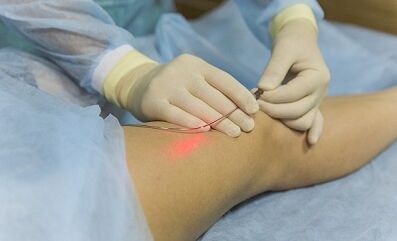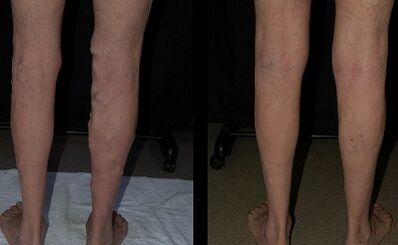
To undergo treatment with varicose veins with a laser, simply get the direction of a phlebologist.There is no need for hospitalization and prolonged preparation of the patient;Therefore, laser treatment of varicose veins is performed on an outpatient patient.
The impact occurs regardless of the patient's caliber.It can be a small vascular mesh or a great nodal formation.The next day, the patient can completely return to his usual lifestyle with insignificant restrictions.
Before performing the procedure, a study of the affected zone and a clear definition of its limits using ultrasonic research is performed.It is extremely important to determine the presence of tributaries of tributaries.
Endovasal (or intravascular) laser acts on the principle of selective absorption of oxygmoglobin and hemoglobin.The patient is in a horizontal position.The surgeon first processes the puncture site, makes a puncture of puncture in its size and introduces a catheter into the sick vein lumen, which is a flexible tube with light light.With the help of the heat it emits, the ship's walls are welded and manufactured.As a result, blood ceases to flow through the vienna, moves from the general circulation and then turns into a discreet fibrous litter.
After the catheter is extracted, a small sterile dressing is applied to puncture.After intervention for the patient, wearing special underwear for varicose veins, which will create the necessary compression.
The advantages of the method
- Laser treatment is highly effective and provides a real result.
- Rehabilitation after being a matter of hours.
- The operation lasts no more than an hour.
- During manipulation, skin, tissues and other ships are not violated.
- The aesthetic advantage is that at the scene of catheter implementation, there is no trace.
- The technique is suitable for people with a low pain threshold as it is almost painless.
- It is possible to treat on several ships and different members in a session.
- The possibility of combined exposure, for example, using sclerotherapy.
- The use of local anesthesia guarantees the minimum number of negative cases of intolerance, such as general anesthesia.
To determine the need and possibility of such an operation, it is necessary to first do a duplex ultrasound and scan study.
For whom this treatment is shown
At the moment, there are many ways to get rid of varicose veins.This is Sclerotherapy, Flebecctomy, Radiofrequency Effects.

The removal of varicose veins with a laser is performed if:
- The vein extensions of up to 10 mm occurred;
- A small number of tributaries affected by the disease is determined;
- The vein course is uniform, without curves, in the presence of a laser treatment curve, you can use two LEDs with a catheter, the conviction of the severe vein is a full against the operation;
- It is also impossible to perform the procedure in the presence of complications, as a formation in the area of damage to the trophic ulcers.
Many experts recommend laser treatment as a modern alternative to total surgical intervention.In addition, the conduct of such a noninvasive procedure in the presence of a modern type of equipment and sufficient doctor's qualifications allows us to talk about a high degree of safety for the patient.
With severe and multiple pathology, it is sometimes necessary to hold several treatment sessions.How many of them are required for each patient, only the doctor determines, depending on the duration and degree of neglect of the disease.An important factor in solving such a question is the age and general condition of a person.Sometimes, after intervention, a small redness of the skin, which passes very quickly and does not require additional exposure.
Rebilitation
After the operation, the patient should take a walk on a slow pace, but not less than 40 minutes.Then it should use compression meshes and use it constantly for about five days.
In the early days later, it is not recommended to sunbathe, engage in exercise, take a hot shower.
Against -indications
Despite sufficient security, the therapy with the help of a laser has certain against -indications:
- Pregnancy and breastfeeding.
- The use of glucocorticoids and agents that contribute to photosensitization in treatment.
- Expressed processes expressed.
- Severe chronic diseases with the development of renal, liver and pulmonary failure.
- Diabetes anyway.
- Thrombophlebitis.


















